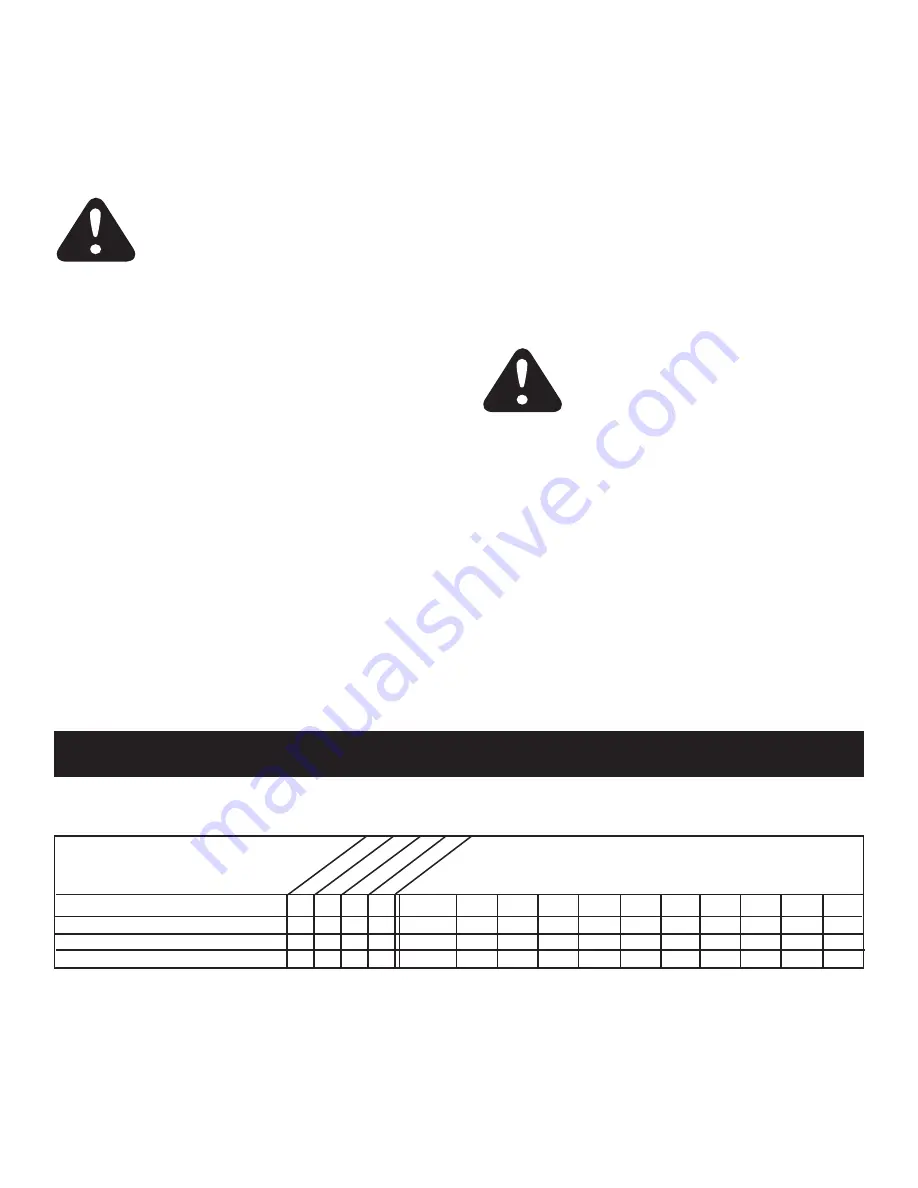
26
raISING aND LowerING
• To raise, push down on the lift handle until the snow
thrower locks in the raised transport position.
• To lower, push down slightly on the lift handle and pull
the trigger. With the trigger pulled, slowly lower the
snow thrower until it reaches the ground.
CuSToMer reSPoNSIBILITIeS
• Read and follow the maintenance schedule and the maintenance procedures listed in this section.
Service Dates
Check for loose fasteners
X
Check scraper and shoes for wear
X
X
Cleaning
X
Lubrication Section
X
MAINTENANCE SCHEDULE
Fill in dates as you
complete regular service.
Bef
ore each use
After each use
Ev
ery season
Bef
ore stor
age
LuBrICaTIoN
•
Oil all pivot points on the snow thrower.
• Oil the pivot points of the two idler arms on the clutch/
idler assembly.
• Apply penetrating oil to the control cables of the
discharge chute.
• Apply a good grade of spray lubricant to the trigger
assembly and the chute tilt control assembly.
CauTIoN
:
Do not operate the snow
thrower without the rear weight attached
to the tractor to provide extra traction and
stability.
MaINTeNaNCe
CHeCK SCraPer aND SHoeS For wear
(Refer to figures 59 and 60 on page 27)
• The scraper plate and skid shoes on the bottom of the
snow thrower are subject to wear. To prevent damage
to the spiral auger housing, replace plate and shoes
before wear is excessive.
reMoVING SNow
Snow removal conditions vary greatly from light fluffy
snowfall to wet heavy snow. Operating instructions must
be flexible to fit the conditions encountered. The operator
must adapt the lawn tractor and snow thrower to depth of
snow, wind direction, temperature and surface conditions.
• Before beginning operation, thoroughly inspect the
area of operation and remove all door mats, sleds,
boards, wires and other foreign objects.
• The spiral auger speed is directly related to engine
speed. For maximum snow removal and discharge,
maintain high engine r.p.m. (full throttle). It is advisable
to operate the lawn tractor at a slow ground speed
(1st gear) for safe and efficient snow removal.
• In deep, drifted or banked snow it will be necessary to
use full throttle and a slow ground speed (1st gear).
Drive forward into the snow, depress the tractor's
clutch-brake pedal and allow the spiral auger to clear
the snow. Repeat this method until a path is cleared.
On the second pass, overlap the first enough to allow
the snow thrower to handle the snow without repeated
stopping and starting of forward motion.
• In extremely deep snow, raise the snow thrower from
the ground to remove the top layer and drive forward
only until the tractors front tires reach the uncleared
bottom layer of snow. Depress the tractor's clutch-
brake pedal and allow the spiral auger to clear the
snow. Reverse the tractor and lower the snow thrower
to the ground. Drive the tractor forward until the snow
again becomes too deep. Repeating this process into
and out of drifts will eventually clear even the deepest
of snow piles.
• If the snow thrower becomes clogged with snow or
jammed with a foreign object, disengage the snow
thrower immediately and shut off the tractor engine.
Unclog the snow thrower before resuming operation.
oPeraTING TIPS
• Discharge snow down wind whenever possible.
• To help prevent snow from sticking to the snow thrower,
allow the snow thrower to reach outdoor temperature
before using it. A light coat of wax may also be applied
to the inside surface of the snow thrower housing and
discharge chute.
• Use tire chains to improve traction.
• Use rear wheel weights to improve traction.
• Before the first snowfall, remove all stones, sticks and
other objects which could become hidden by the snow.
Permanent obstacles should be marked for visibility.
• Overlap each pass slightly to assure complete snow
removal.
DaNGer
:
Shut off engine and
disengage snow thrower before
unclogging discharge chute. Unclog using
a wooden stick, not your hands.











































